The OCZ Vertex 3 Review (120GB)
by Anand Lal Shimpi on April 6, 2011 6:32 PM ESTRandom Read/Write Speed
The four corners of SSD performance are as follows: random read, random write, sequential read and sequential write speed. Random accesses are generally small in size, while sequential accesses tend to be larger and thus we have the four Iometer tests we use in all of our reviews.
Our first test writes 4KB in a completely random pattern over an 8GB space of the drive to simulate the sort of random access that you'd see on an OS drive (even this is more stressful than a normal desktop user would see). I perform three concurrent IOs and run the test for 3 minutes. The results reported are in average MB/s over the entire time. We use both standard pseudo randomly generated data for each write as well as fully random data to show you both the maximum and minimum performance offered by SandForce based drives in these tests. The average performance of SF drives will likely be somewhere in between the two values for each drive you see in the graphs. For an understanding of why this matters, read our original SandForce article.
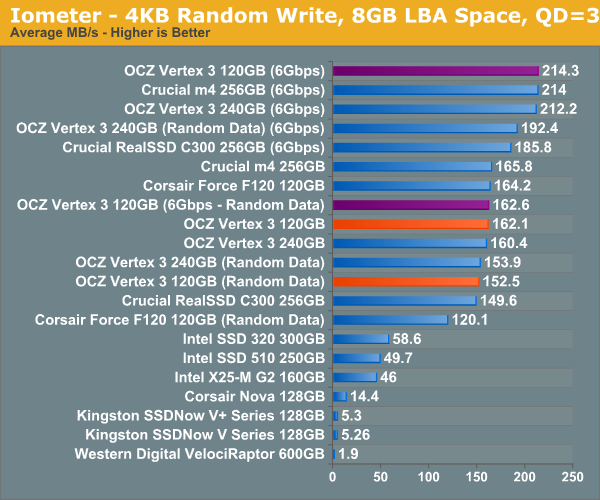
Peak performance on the 120GB Vertex 3 is just as impressive as the 240GB pre-production sample as well as the m4 we just tested. Write incompressible data and you'll see the downside to having fewer active die, the 120GB drive now delivers 84% of the performance of the 240GB drive. In 3Gbps mode the 240 and 120GB drives are identical.
Many of you have asked for random write performance at higher queue depths. What I have below is our 4KB random write test performed at a queue depth of 32 instead of 3. While the vast majority of desktop usage models experience queue depths of 0 - 5, higher depths are possible in heavy I/O (and multi-user) workloads:
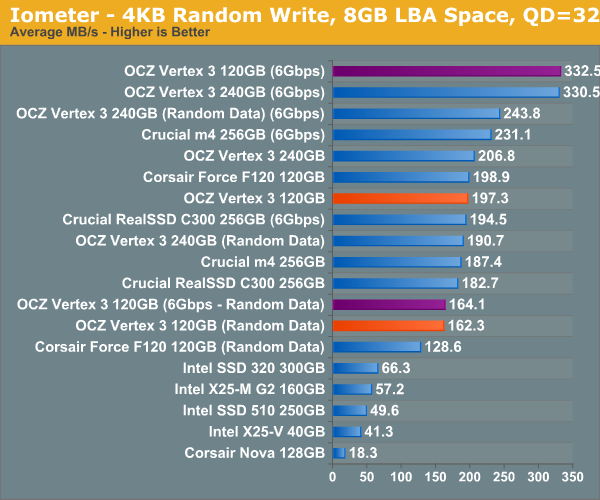
At high queue depths the gap between the 120 and 240GB Vertex 3s grows a little bit when we're looking at incompressible data.
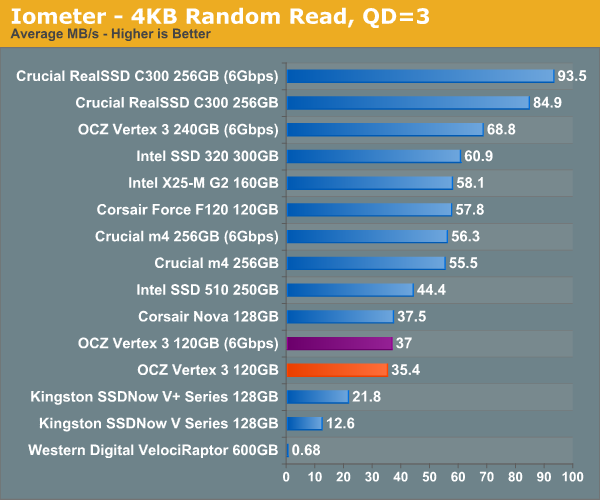
Random read performance is what suffered the most with the transition from 240GB to 120GB. The 120GB Vertex 3 is slower than the 120GB Corsair Force F120 (SF-1200, similar to the Vertex 2) in our random read test. The Vertex 3 is actually about the same speed as the old Indilinx based Nova V128 here. I'm curious to see how this plays out in our real world tests.
Sequential Read/Write Speed
To measure sequential performance I ran a 1 minute long 128KB sequential test over the entire span of the drive at a queue depth of 1. The results reported are in average MB/s over the entire test length.
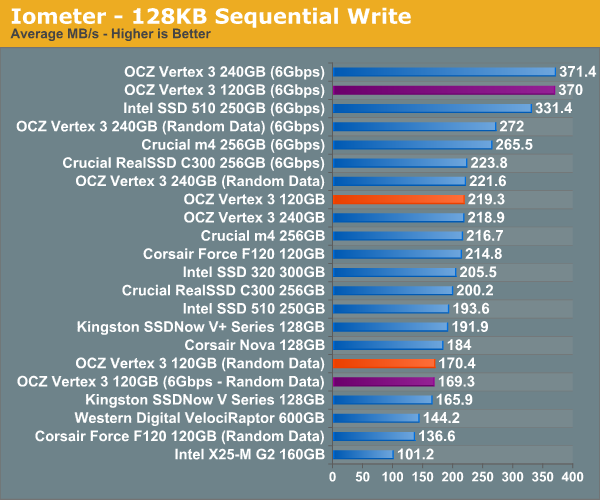
Highly compressible sequential write speed is identical to the 240GB drive, but use incompressible data and the picture changes dramatically. The 120GB has far fewer NAND die to write to in parallel and in this case manages 76% of the performance of the 240GB drive.
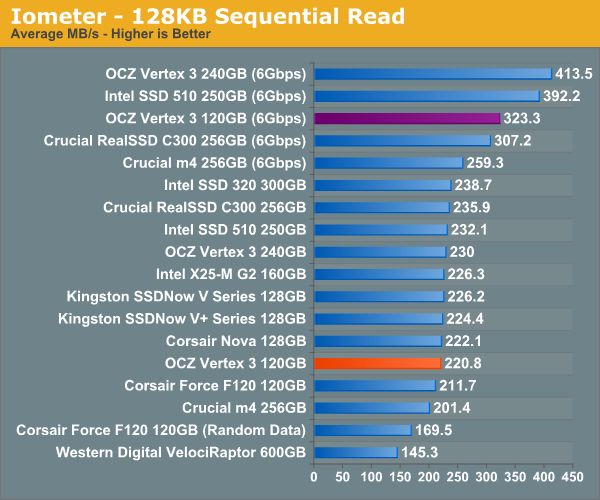
Sequential read speed is also lower than the 240GB drive. Compared to the SF-1200 drives there's still a big improvement as long as you've got a 6Gbps controller.










153 Comments
View All Comments
martixy - Monday, April 11, 2011 - link
So... the SSD market is shaping up to the just about the most confusing and volatile market out there.At least that's the impression I get from the articles here. I mean you'd probably need your very own market research team if you want to get a good deal on an SSD.
Meh...
gixxer - Monday, April 11, 2011 - link
So if you have read all the comments up to this point with the OCZ verus Intel debate.Where would you spend your money?
A vertex 3, Intel 320, or Intel 510
MamiyaOtaru - Tuesday, April 12, 2011 - link
it's not scientific, but after looking at the newegg user review averages, not touching anything other than inteltech6 - Monday, April 11, 2011 - link
Thank you Anand - you're a real asset to the tech community!While OCZ has a potentially great product, they are really proving to be their own worst enemy. Until they demonstrate some maturity I will choose an Intel 320 instead. It may not be the newest or fastest but the G1/G2/G3 series drives have so far proven to be reasonably reliable and perform as advertised.
ClagMaster - Monday, April 11, 2011 - link
Seems to me the Intel 510 offers better mainstream performance than the Vertex 3.And I also think Intel does a better job with balancing firmware with memory technology, and has better configuration control of what memory is used for their SSD's.
I think suffering a 20% risk of getting a Vertex 3 SSD with slower memory is too high for what I pay for such a device
qax - Wednesday, April 13, 2011 - link
This sort of commitment can make me wanna buy OCZ next time, thats for sure.Although they shipped slow drives, they accept the responsability, and thats a big thing in my world.
I´ve totaly stopped buying som vendors that are too cheap, resulting in useless/nonexisting support.
Same reason why i allways buy from a psysical shop and never from internetshops.
I need psysical adress not too far from my own adress, where i can turn in a faulty product.
For me an SSD driver will allways be used for OS, programs and games. For space i would have HDD.
So space on SSD is no concern.
javishd - Wednesday, April 13, 2011 - link
I think I'm not alone here. Waiting to buy after some real comparisons of the $300 120gb range. We look to you for help with the decision! Thanks for your long term commitment to ssd. I've been on board since the x25 g1, and I really appreciate all the info from you guys. I'll keep checking every day hoping....alexb1 - Wednesday, April 13, 2011 - link
Anand, THANK YOU VERY VERY MUCH!Honestly, there is NO ONE ELSE in the IT industry advocating for enthusiast consumers like you... kudos!
I am A VICTIM of OCZ Marketing of Vertex2, and got a 80GB recently that basically does EXTREMELY POOR compared to ALL benchmarks. To top it all off, it is NOT part of the *recall* drives as its size hasn't been affected with the 25nm transition... so I am just about to return and take a 15% restocking fee.
Now, my question is... should I even bother looking for a 34nm drive, or one of the newer 25nm drives would just do ok as boot drive in Win7? My MOST CONCERN is reliability and longevity.
I can either get a F60-A (25nm), F60 (34nm), or OCZ Vertex2 (25nm)... The 25nm being $30-40 CHEAPER!
faster - Thursday, April 14, 2011 - link
Today the Intel 510 250GB drive mentioned in these benchamarks can be had at newegg for $615 (-$40 off promo until 4/19, $575).The Egg also has the Revo Drive X2 240GB at $570 (was $680).
So we as consumers have the new 250 GB 6Gbps SATA3 SSD drives vs. the 240GB PCIE X4 integrated bootable RAID 0 card within $5 of the same price point.
Certainly a bootable add in card is not a straight comparison to a single SSD drive, but at the same price point, in the cutting edge overpriced enthusiast level, it is a sensible comparison.
Anandtech should put the RevoX2 in these benchmark charts to show how they measure up. It would be more interesting than comparing a WD Raptor represented by tiny slivers on the performance comparisons. I believe, generally speaking, that the Revo would come away with faster read speeds and be neck in neck with fastest SSD drives on write speeds. AnandTech had or has a RevoDrive that they reviewed in the past. Is that thing still laying around?
daidaloss - Thursday, April 14, 2011 - link
@fasterI second your petition to Anand to put the Revo2 on the charts, so us, real power user, would have an idea how do SSDs compare with PCI raid cards.
Also, sure would be interesting to see how do SSD compare to ram drives like the HyperDrive5. Supposedly this thing boots up in 4 seconds. Should be interesting to compare such a system with a modern SSD.